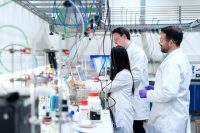
Scientists have discovered a new key cause of rheumatoid arthritis, pointing towards the possibility of an effective treatment being available in the next three to four years, a new study published in the journal Med reveals. The study found that when a leaky gut develops (caused by damage to the gut lining), bacteria crosses the gut lining and enters the body — therefore exacerbating inflammation in the stomach and joints. In turn, existing stomach-repairing drugs may be a viable treatment for the condition, which is promising news for the third of people with rheumatoid arthritis who don’t find relief in current therapies. The study was funded by two government bodies, the Medical Research Council and UK Research and Innovation, as well as the Versus Arthritis charity.
Repairing gut damage
The researchers found, even in the condition’s early stages, people with rheumatoid arthritis had greater damage and inflammation to the gut compared to healthy people. The damage also worsened as the condition progressed. “Our findings are exciting. They suggest that the stomach lining is a therapeutic target. Importantly, we found that using existing drugs that restore the gut-barrier integrity, could reduce the severity of arthritis,” says Professor Claudia Mauri, of University College London. Existing stomach-repairing drugs used for Crohn’s disease, celiac disease, and digestive disorders are now being looked at for clinical trials in the treatment of rheumatoid arthritis in humans. A drug (named AT1001) presently in clinical trials for Coeliac disease has been found effective at repairing the gut lining in lab tests on both mice samples and human tissue. Researchers are also looking at vercirnon, which is already used to treat Crohn’s disease.
Preventing rheumatoid arthritis
As it stands, rheumatoid arthritis has no clear-cut cause. However, steps can be taken to reduce known risk factors. For example, women diagnosed with rheumatoid arthritis at age 55 or younger are more likely to be overweight. So, maintaining a healthy weight can reduce the likelihood of developing rheumatoid arthritis. Exercise, in particular, plays a key role in healthy weight loss with strength training being essential to prevent bone loss — a potentially severe side effect of rheumatoid arthritis. Moreover, various therapeutic compounds can also further help people lose fat, build muscle, and increase bone density, however, companies such as umbrella.is and other professionals in the field feel more research is needed in order to ensure great results.
“This new research looks promising but it is still very early days,” comments Arthritis Action’s medical advisor Wendy Holden. Ultimately, it’s hoped, “in a best case scenario, an existing drug will be found to be effective and become available for rheumatoid arthritis patients within three to four years”, said Prof Mauri. However, she also emphasized that finding an effective treatment may take many more years and may even never happen. Nevertheless, this new research is truly helpful in opening up fresh pathways for exploration.
Interesting Related Article: “What is occupational therapy? Definition and examples“
